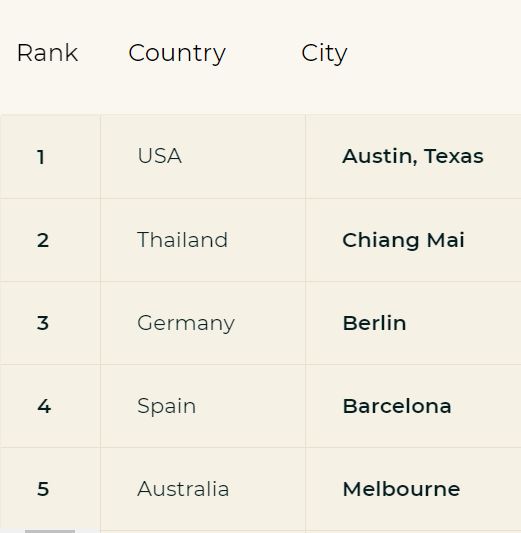Why this town ranks No. 1 for International Freelancers
“We long for the days when we’ll enjoy a live show, clink our glasses, and gather around a bowl of queso together…” These are the words that welcome visitors to the Visit Austin website. These words are to remind the local Texans and those that have been hankering for a visit to the not-what-you-expected capital that this vibrant tech town is ready to get back in action (again) following COVID-19 lockdown measures.
Austin, Texas, also known as ‘Silicon Ranch’, is giving California’s Silicon Valley a run for its money. Home to Dell and the entrepreneurial playground of ‘Dellionaires’, Austin is ranked the top place for freelancers to work and live in the world, according to a Carphone Warehouse survey.
Where are the cowboys?
Austin has a way of surprising people. Especially for its thousands of international IT workers who have now come to call Austin home. There is more talk of Austin-roasted coffee beans and Hill Country wines than rodeos and cowboy sightings. However, you can instead get live country music on tap, along with every other type of tune. Austin’s claim to fame is being the Live Music Capital of the World. And according to some, the best margaritas.
Austin ranked as the number one city for freelancers to work and live from 30 cities around the world. The survey criteria were based on how cities fare on employment rate, average monthly salary, the number of co-working spaces, internet speed, and commute satisfaction, according to a Carphone Warehouse survey.

“The city that trademarked the slogan “Keep Austin Weird” might have cool, eclectic businesses and food trucks that make weird things like ice cream using liquid nitrogen, but what really sets Austin apart is the great people, great neighbourhoods, and affordable housing,” writes city-data site Homesnacks.
The Austin techdom
Its technology hub is home to some of the largest software and technology companies in the world, including Google. It is also home to some of the world’s most innovative software designers and IT engineers, which is why the latest tech unicorn to open shop in Austin is Australia’s Canva, the $6bn Do-it-Yourself graphic design template and stock photography site. The company is looking for a Senior Recruiter, according to its LinkedIn page. At the time of writing, there were already 200 applicants, and that was just on LinkedIn.
Another tech company that is opening operations in Austin, which has a lower cost of living and comparatively lower wages to Silicon Valley and San Francisco, is Stitch Fix, the online personal stylist and clothing retailer.
Stitch Fix is planning to hire 2,000 stylists in places like Dallas, Austin, Cleveland and Minneapolis, due to the difference in cost of living wages, according to The Austin Business Journal. The average tech worker salary in Austin is $137,000 compared to San Francisco’s $155,000, according to a Hired report.
Stitch Fix said it will be offering its laid-off stylists in San Francisco the option to relocate. If they choose not to, they will be given a two-week severance, health care package and help finding a new job, it was reported.
Worth the move?
The sleek-yet-relaxed appeal of its city neighbourhoods can also be attributed to its luxury shopping streets, rivers, and watering holes to cool off in. This really is a shop at a luxury boutique on South Congress Avenue by morning to ‘river tubing’ by noon on the San Marcos river type of place.
For those freelancers, namely limited company IT contractors that are considering moving abroad, Austin does have its weird and wonderful benefits. Electrical engineers are in very high demand and the US workforce does not have ample supply.
The only snag in those plans would be a temporary suspension applied by US President Donald Trump on issuing new work H-1B and other foreign worker visas, such as L-1 inter-company employee transfers. The President made the move to ensure unemployed Americans during the unemployment crisis will have access to more job opportunities. However, if the majority of IT worker roles in demand do not meet the US workforce skillset this encourages companies to expand their recruitment net overseas.
Third-party firms including Accenture, Cognizant and Tata Consultancy place software engineers and other skilled workers inside large companies in the US and elsewhere, according to a Silicon Valley Business Journal report.
IT tech executives have expressed in the business press following news of the visa suspension that not enough US graduates are studying the requisite degrees for the technology in demand. They also fear that their target talent will go to neighbouring Canada instead, leaving a skills gap within their fast-growing businesses, which is not good for them or the US economy.


